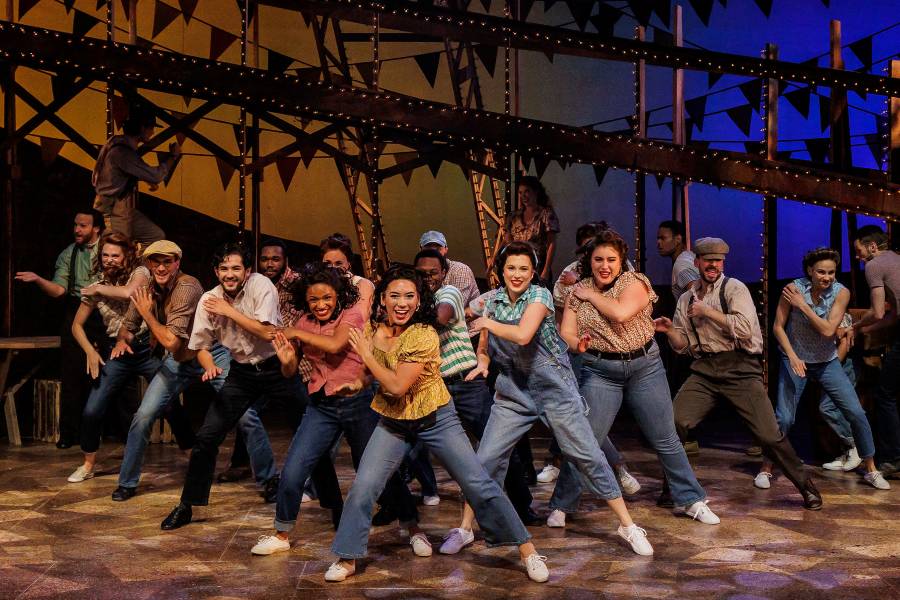Summer stock—the time-honored tradition of professional theatres that primarily operate from early through late summer, with repertory companies that rehearse and perform simultaneously—is still very much a thing. As someone who worked as a music copyist at a summer theatre (the O’Neill) just last summer, I understand its importance for theatre workers, from emerging performers on their first professional contracts to seasoned artists enjoying the challenge of multiple shows and creating new works.
But how is summer stock doing, really? I wanted to take a vibe check on this venerable tradition, which like the rest of the theatre field has emerged from Covid lockdowns and other challenges with some things the same, some things different. What I found is that, on the talent side, the competition feels stiffer (perhaps oversaturated), though artists searching for opportunities during the audition season—typically winter through spring—are finding community through research and collective commiseration. Meanwhile, on the institutional side, theatres continue to recover while facing new challenges.
Here Comes Everybody
One area of summer stock that has changed is the relationship of the potential talent pool to auditions, partly due to a culture shift represented by such social media groups where performers and aspirers can share intel and advice.
Many performers enter the circuit via such combined auditions as the Southeastern Theatre Conference (SETC), United Professional Theatre Auditions (UPTA), and the A1 Conference. These conferences require participants to pay a fee to be seen by a number of theatres, with initial auditions by video or in-person required prior to the call. (Some longtime conferences, including StrawHat Auditions, no longer operate post-pandemic.) Some theatres also participate in combined auditions. Others don’t and instead accept a range of auditions: Equity Principal Auditions (EPAs) locally and in major audition hubs in-person, direct submissions, combined audition events, college showcases, and more.
Sources told me that this world has become both more accessible and a bit more crowded. In 2019, 19-year-old Patti Meadors, then a BFA musical theatre major at Southeast Missouri State University, started the Facebook group Summer Stock: The Musical. “High School Musical: The Musical: The Series had just come out,” said Meadors, now 26 and based in Chicago, “and I was talking about how I wished there was a Facebook group for summer stock, similar to how there was one for college auditions.”
The group has since grown into a resource for more than 12,000 artists. Anyone seeking summer stock work can join; a screening process protects members discussing sensitive topics. It has grown so much, in fact, that Meadors enlisted an admin team, including “right-hand man” Jesse Hartley. She and members developed open-source spreadsheets compiling lists of summer theatres, company representative spreadsheets where members volunteered to share experiences, and other resources.
With more resources, though, comes increased competition. “It’s been a crazy, wild ride of figuring out what this industry is turning into and what it’s grown from,” Meadors said. “A lot of people have been feeling like there’s been an uptick in people auditioning and are like, ‘I feel like SSTM is the reason for that, because it’s so much more accessible.’ I’m like, ‘Yeah, it’s a good problem to have.’ But I do hear people feeling the heat.”
Theatre Communications Group (TCG) member theatres have noticed an uptick in submissions from young people. John J. Wooten, artistic director of Premiere Stages at New Jersey’s Kean University (which runs a summer season and internship program, operating in summer and fall), said they received upward of 1,000 submissions for roles in the first years after the pandemic lockdowns, when self-tape EPAs and younger roles were available. Though Equity mandates in-person EPAs, Premiere Stages, like many others, still holds “invited calls” for non-union actors as self-tapes.
Meadors said they attended SETC once, but booked their summer stock gig partly due to college connections; Hartley screened before SETC in 2019. Both prefer self-submission. As Hartley put it, “That has made it easier to keep working day jobs and following my other passions in addition to auditioning, so auditioning doesn’t take over my life. I don’t think I can justify paying money to audition; I don’t want to pay to have a job.”
Did Video Kill the Audition Star?
Creede Repertory Theatre, a major Rocky Mountain summer repertory theatre for over 60 years, conducts in-person auditions in Denver as well as video submissions. Though screening 600-700 submissions takes time (compared to the pre-2020 average of around 200 to 300), transitioning to videos as a standard “opened a lot of hiring options for us with casting, since our remote location makes it difficult to travel to hubs like New York, L.A., or Chicago,” said artistic director Emily Van Fleet. “We are happy with this method because of the added accessibility for both ourselves as producers and for the actors.”

Chautauqua Theater Company, another company sought out for summer work in upstate New York, takes a combined approach, working with the Telsey Office in New York City for Equity roles through EPAs and accepting video auditions nationally and internationally for their summer acting conservatory. In her three seasons, producing artistic director Jade King Carroll said, submissions for the conservatory have gradually increased. This has included a significant rise in submissions from undergraduate and less formal training programs, and “an impressive number of conservatory applicants from Brown/Trinity Rep, which is quite understandable given what’s just happened with the program,” King Carroll said.
Despite the prevalence of self-tapes, many theatres still prefer to cast via in-person Equity Principal Auditions (EPAs). Brett Smock, producing artistic director at The REV Theatre Company in Auburn, New York (which produces six shows a summer), prefers in-person auditions prior to video submissions. The Rev sees 5,000 actors a year across their region and sometimes Los Angeles in their own calls, and opts not to attend combinted audition gatherings.
“Since the pandemic, there has been a desire from actors to audition via video,” Smock said. “However, believing that the magic happens in the room, I have insisted that our process be in-person.”
It’s definitely different to be seen IRL versus submitting videos en masse. For artists attending in-person EPAs, the excitement is palpable, according to Arrow Rock Lyceum Theatre’s interim artistic director Alan Knoll. At the Missouri-based theatre’s EPA in New York this year, they had an “unprecedented turnout,” with nearly 500 individuals seeking five-minute time slots for their 2025 season.
“The New York auditions were filled with comment after comment from the actors about how great it was to be seen live and in-person,” Knoll said. “Their excitement and enthusiasm was palpable and contagious. We felt it too, watching them perform.”
For the Contemporary American Theater Festival in Shepherdstown, West Virginia, which held EPAs in D.C., New York, and locally this year, artistic director Peggy McKowen said this summer feels different than her first summers after the pandemic shutdown. Their upcoming season in July-August features five world premieres, and conversations about connections to D.C. are in the works.
“Momentum is building earlier and more energetically for the upcoming summer,” she said. “It feels like audiences and artists are focusing on their love and passion for the work and being together, and maybe a sense of confidence and knowing that, for many of us, making great art in the summer is what we do, and we’ll never give it up again.”
Work Smarter, Not Harder
Summer stock is notorious for having an intense, even punishing schedule. Though winked at or excused for generations, in more recent years this tradition has been questioned, as when Williamstown Theatre Festival crew members walked off the job in 2021, the same year that apprentices and writers’ assistants the Eugene O’Neill Theatre Center called in leadership over working conditions there.
Companies have been taking note. Linda Fortunato, artistic director of Peninsula Players Theatre in Fish Creek, Wisconsin, said the past few years have improved social and workplace awareness, particularly around changeover times between productions, which have been adjusted without losing performances, and reconsidering size and scope to make design achievable. Adjustments have included instituting a season rep lighting plot, moving first technical rehearsals later, and encouraging earlier release times for long work days.

Creede’s Van Fleet concurred. “Every decision now requires an extra level of thoughtfulness, whether it’s about hiring, materials, or even the scale of productions themselves,” she said. In Creede’s case, this meant reacclimating to working in close quarters in 2021-22 and getting back in the swing of things in 2023-24. Before 2020, non-union workers who needed housing had to pay a fee. The company now offers free housing for all non-local summer employees, which costs the company more than $75,000.
Rising costs in Colorado also made “summer stock…undeniably more expensive to produce than it was pre-2020,” Van Fleet said. They are currently operating at about 75 percent of their 2019 staff size, with a tightened budget, though compensation has also increased 25 percent in that time. According to managing director Morgan Manfredi, Colorado compensation law changed significantly in 2020, making exempt salary floors of $35,568 in 2019 rise to $55,000 in 2024 (a 55 percent increase), and minimum wage of $11.10 in 2019 to $14.42 in 2024 (a 30 percent increase). It’s better for the workers to be paid more, of course, though it does limit hiring.
At a preview of CATF’s upcoming season held at Washington, D.C.’s Martin Luther King Jr. Library in April, I saw CATF staff, led by McKowen, poetically read aloud a statement to create “fearless stories” with “words that matter,” knowing that it may affect their ability to receive grants under the current Presidential administration. It was a great reminder of why unabashedly unafraid work in a summer repertory environment is important. McKowen asserted that the company aims to observe a “sharing of process [that] helps us better prepare a situation and space to support a variety of artists’ needs—to create a place where they feel welcomed and individually valued.”
Calls for change have also been heard at the Summer Stock: The Musical group, where Meadors and Hartley saw it through the 2020 lockdowns, then the rebuilding of the past few years. SSTM has also put this change into practice as a forum for gig intel and gauging safety as artists weigh offers. SSTM, Meadors said, has helped to fulfill the role of “protecting young artists in compromised positions, to hopefully not be in positions where they’re being taken advantage of—financially, or physically, or emotionally—as well as to share the successes and joys of being able to perform during the summer and making a livelihood out of this. It opened up a new conversation about expectations that we hold people to, how to keep artists safe, and making sure that everyone can do their job to the best of their ability.”
Willingness to work for lesser pay is one heavily contested value, with young people increasingly considering their worth. Admins try to lead by example, educating members about equity, reading their contracts, and identifying fair treatment. Hartley, based in Manhattan, gave examples of gigs he described as “not good,” including one that “pays $12 an hour and you have to pay for your accommodations to wear a mascot costume in the middle of summer.” (He did not take that job.)
The pandemic taught artists to pursue their niches, which means that casting a wide summer stock net may not be as effective as aiming for specific projects that artists feel they are right for—not only for the summer, but year-round. Hartley, who identifies as a trans man, pursues projects emphasizing trans representation. Though it would be fun to be considered for a show like Jersey Boys in summer stock, he knows what he’s right for. “I think that is why I feel like I’m a bit of an observer in the rat race at times, because I am just playing a little bit of a different game,” he said.
Hartley said that fellow ushers at NYC Ballet, where he works, often talk wistfully about the summer stock they did in their younger years, and how they met people there who “put them in all their shows.” Groups like SSTM may be the modern-day equivalent of that kind of network; indeed, Hartley has developed new work with people he met through the group. “It’s sort of like how they were doing that, but they were doing that by being in the right place at the right time,” Hartley said. “What’s beautiful about the group: It gives you access to be in that place at all times.”
Said Meadors of SSTM, “I did not mean for it to blow up the way it did, but I’m extremely grateful for the community that we’ve built. It has put faith back in the community-building of theatre, especially for young professionals.” It may also have a more everyday benefit: “Inherently, pursuing musical theatre as a full-time adult can make you go a little loopy if you don’t have people reality-checking you and grounding you,” Hartley said.
Bonus feature: The TCG Summer Theatre List
Below are the theatres listed as summer stocks among TCG members. The original list included theatres that also produce during summer months as part of their regular year-round season but weren’t traditional summer stock theatres, so I’ve pared it down.
My takeaways: TCG members are mostly Equity regional houses and festivals during the summer. Some don’t necessarily consider themselves traditional “stock,” despite having the rigorous feel of a summer stock, as McKowen said of CATF and King Carroll said of CTC. This shows how many regional theatres produce during summer that young professionals need to be aware of that are not summer stock. (It also shows how many summer stocks are non-union and not TCG members. A good resource is Early Career Live Entertainment’s directory of summer theatre.)
Traditional summer stock:
Arrow Rock Lyceum Theatre (Arrow Rock, Mo.)
Creede Repertory Theatre (Creede, Colo.)
Hangar Theatre (Ithaca, N.Y.)
Ogunquit Playhouse (Ogunquit, Maine)
Peninsula Players Theatre (Fish Creek, Wisc.)
Peterborough Players (Peterborough, N.H.)
Premiere Stages at Kean University (Union, N.J.)
The REV Theatre Company (Auburn, N.Y.)
The Western Stage (Salinas, Calif.)
Weston Theater Company (Weston, Vt.)
Will Geer’s Theatricum Botanicum (Topanga, Calif.)
Summer theatres of various kinds:
American Players Theatre (Spring Green, Wisc.)
Chautauqua Theater Company (Chautauqua, N.Y.)
Contemporary American Theater Festival (Shepherdstown, W. Va.)
Dorset Theatre Festival (Dorset, Vt.),
Eugene O’Neill Theater Center (Waterford, Ct.)
Hudson Valley Shakespeare (Garrison, N.Y.)
Idaho Shakespeare Festival (Boise, Idaho)
Pennsylvania Shakespeare Festival (Center Valley, Pa.)
St. Louis Shakespeare Festival (St. Louis, Mo.)
Utah Shakespeare Festival (Cedar City, Utah)
Williamstown Theatre Festival (Williamstown, Mass.)
Support American Theatre: a just and thriving theatre ecology begins with information for all. Please join us in this mission by joining TCG, which entitles you to copies of our quarterly print magazine and helps support a long legacy of quality nonprofit arts journalism.
Related

Know a Theatre: Coachella Valley Repertory Theatre of Rancho Mirage, Calif.
The theatre company caters to Coachella Valley residents and visitors with themed seasons.
In "Know a Theatre"

Know a Theatre: Broadway Rose Theatre Company of Tigard, Ore.
This one-time summer stock theatre in a Portland suburb is now Oregon's biggest musical theatre.
In "Know a Theatre"

REV Theatre Company Announces Summer Season
Previously known as the Finger Lakes Musical Theatre Festival, the REV will produce three musicals this summer.
In "Mid Atlantic"





